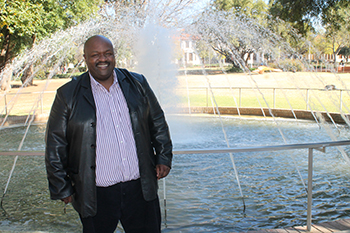“If the SBL has acknowledged you,
it means the research you are doing
is solid. There are people out there
who want to listen to my paper.”
To present a research paper at an international conference of about 10 000 people and where 100 sessions are taking place at the same time is what dreams are made of for an academic. This is no longer a dream for the humble Dr Tshokolo Makutoane who will share his knowledge at the annual meeting of the prestigious Society of Biblical Literature (SBL).
Dr Makutoane, a senior lecturer at the Department of Hebrew at the University of the Free State (UFS), will be a speaker at the conference in Boston, in the US, from 19-21 November 2017. This after receiving a remarkable travel grant from the SBL to present his paper, titled The Contribution of Linguistic Typology for the Study of Biblical Hebrew in Africa: The Case of Sesotho Pronouns.

Dr Makutoane, senior lecturer at the Department of
Hebrew at the University of the Free State, was
speechless when he heard he will be presenting a
paper at the annual meeting of the Society of Biblical
Literature in Boston in the US.
Photo: Jóhann Thormählen
Scholars from around the world participate
His paper is part of a thematic session on “Theoretical Approaches to Anaphora and Pronouns in Biblical Hebrew” in which scholars from Canada, the US, Australia, Europe and Israel will participate.
The research Dr Makutoane will be showcasing in Boston is about teaching Biblical Hebrew in Africa, and more specifically, pronouns, to Sesotho-speaking students.
“SBL is one of the largest organisations in the world and if you get the opportunity to present a paper there, it is one of the highest honours in our context you can have,” Dr Makutoane said.
“If the SBL has acknowledged you, it means the research you are doing is solid. There are people out there who want to listen to my paper.”
According to the SBL website (https://www.sbl-site.org) more than 1 200 academic sessions and workshops will take place at the conference, co-hosted by the SBL and the American Academy of Religion.
Highlight of researcher’s entire career
Receiving the grant and attending the conference for the first time is the highlight of Dr Makutoane’s career. “I feel very grateful, honoured and humbled. I was speechless when I heard about it. I couldn’t help myself and actually cried,” he said.
The grant, given to only four SBL members – the other three are from Samoa, Nigeria and India – is intended to support under-represented and under-resourced scholars who demonstrate a financial need.
Dr Makutoane thanked his mentors, Prof Jacobus Naudé and Prof Cynthia Miller-Naudé, who assisted him with the application. Naudé is a senior professor at the Department of Hebrew and Miller-Naudé a senior professor and head of the department.
Dr Makutoane, who studied Theology at the UFS and is a minister at the NGKA Rehauhetswe church near Bloemfontein, is also grateful to his church that gave him the opportunity to study at the UFS and be able to work at the university.